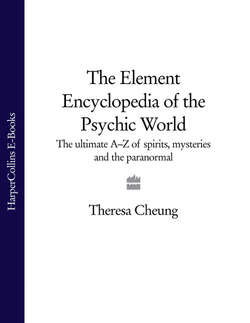Читать книгу The Element Encyclopedia of the Psychic World: The Ultimate A–Z of Spirits, Mysteries and the Paranormal - Theresa Cheung, Theresa Cheung - Страница 24
AFTERLIFE
ОглавлениеAfterlife (also known as life after death) is the continuation of existence beyond this world or after death. There are various sources for this belief, but the one most relied upon is the testimony of individuals who claim to have knowledge of the afterlife because they have:
Died and been sent back to life (near-death experience).
Visited the afterlife when they were unconscious (out-of-body experience).
Seen the afterlife in a vision. Remembered the afterlife from a previous existence (reincarnation).
Been visited by a representative of the afterlife such as angels or spirits.
Believe the testimonal of shamans or intermediaries between the living and the dead.
Almost every society known has some belief in survival after death, although these conceptions vary enormously. Some common ones are: a continuation of life with little change in the nature of existence; spiritual improvement through a series of stages, planes or levels; a series of lives and deaths before ultimate extinction; or the afterlife as a place of reward or punishment based on faith or good deeds on earth and bodily resurrection at some future date.
Christian folk traditions suggest that the souls of good people are converted into angels upon death. However, a more orthodox reading of scripture suggests that the dead are not transformed until the Last Judgement, which is followed by a resurrection of the faithful.
Christian ideas heavily influenced nineteenth-century spiritualist authors like Andrew Jackson Davis, who dictated his lectures in a trance. Davis suggested that after their death, humans continue their spiritual progress through a series of spiritual spheres until they reach the seventh sphere and become one with the infinite vortex of love and wisdom.
Other cultures believe in a land of the dead and locate it in various places: for the Zulus, for example, it is under the earth, an underworld mirror of this world. For the ancient Egyptians, the afterlife was very important. The believer had to act well during his or her lifetime and know the rituals in the Egyptian Book of the Dead to gain entry into the underworld. If the corpse of the pharoah was properly embalmed and entombed, the deceased would accompany the sun god on his daily ride. Other societies believe in universal-ism, which holds that all will be rewarded regardless of what they have done or believed, while still others consider the afterlife less important compared to the here and now.
Another afterlife concept, found among Hindus and Buddhists, is reincarnation, either as animals or as humans. Followers of both traditions interpret events in our current life as consequences of actions taken in previous lives. Some traditions believe in personal reincarnation, whereas others believe that the energy of one’s soul is recycled into other living things as they are born.
Those who practice spiritualism believe in the possibility of communication between the living and the dead. Some societies distinguish between the ghost, which travels to the land of the dead, and a different part of the spirit, which reincarnates. The ghost part of spirit is thought to be strong three or four days after death, and therefore various rituals are performed to discourage the ghost from returning to haunt the living.
